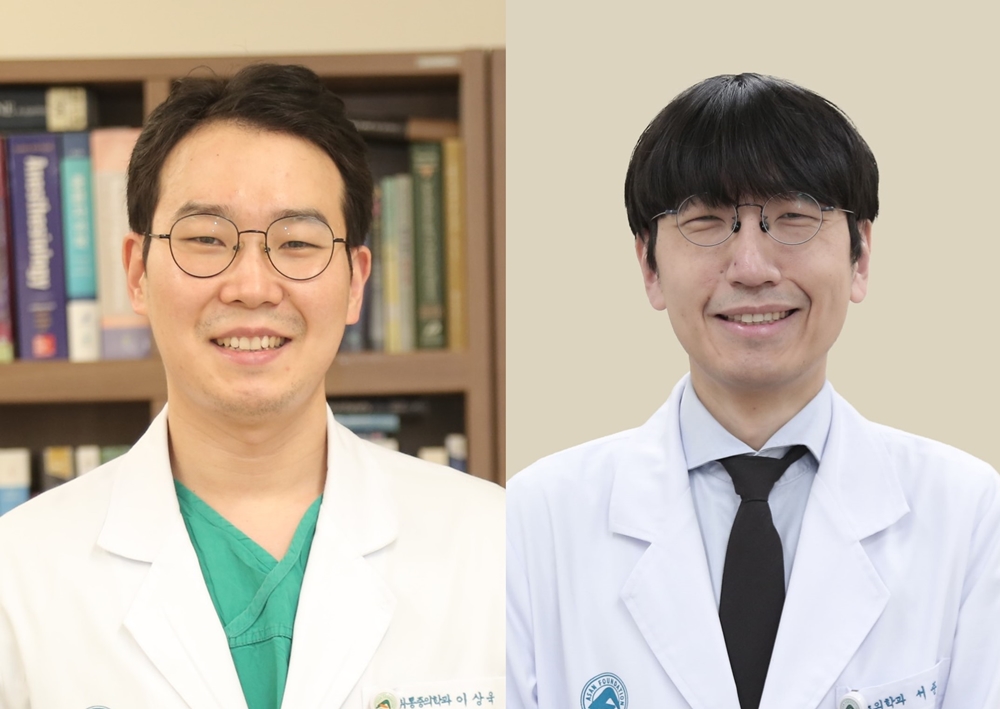-
- Global AMC MENU
- NEWS
- HEALTH
- PEOPLE
- Introduction
Asan Medical Center Professors Sang-Wook Lee and Jungyo Suh Develop Privacy-Preserving Diagnostic AI Based on Homomorphic Encryption
Encrypted Kidney CT Scans Accurately Classified into Normal Kidneys, Cysts, and Tumors

▲ (From left) Professor Sang-Wook Lee of the Department of Anesthesiology and Pain Medicine at Asan Medical Center and Professor Jungyo Suh of the Department of Urology at Asan Medical Center
In recent years, artificial intelligence (AI) has increasingly been used to analyze medical images such as computed tomography (CT) scans, enhancing both the accuracy and speed of diagnosis. However, concerns over potential patient data breaches have consistently raised challenges for the widespread application of AI in clinical settings.
In response, a Korean research team has recently developed an artificial intelligence model that accurately diagnoses kidney diseases using kidney CT scans while ensuring the safe protection of patient information.
A research team led by Professor Sang-Wook Lee of the Department of Anesthesiology and Pain Medicine at Asan Medical Center and Professor Jungyo Suh of the Department of Urology at Asan Medical Center has implemented a deep learning model that classifies encrypted kidney CT images into normal kidneys, cysts, and tumors. The model employs homomorphic encryption technology, which enables computation directly on encrypted data without the need for decryption.
The deep learning model achieved an AUC value of 0.97 to 0.99, a key indicator of disease classification accuracy where values closer to 1 represent higher precision. This result demonstrates that even when patient data remain encrypted, the model delivers analysis outcomes comparable to those of conventional non-encrypted models, with virtually no loss in performance.
The homomorphic encryption technology used in this study is recognized as a form of post-quantum cryptography (PQC), designated as an international standard for secure data protection in the era of quantum computing. Often compared to a “robot arm that can work inside a safe without opening it,” this innovative technology enables real-time computation and analysis while keeping data fully encrypted.
The findings of this study were recently published in ‘Radiology: Artificial Intelligence’ (impact factor 13.2), an international journal issued by the Radiological Society of North America (RSNA).
To develop an AI model capable of analyzing encrypted data, the research team followed three key steps. First, they established a baseline model by training a deep learning system on unencrypted kidney CT images. A total of 12,446 kidney CT scans were used for this purpose, including 5,077 normal images, 3,709 cysts, and 2,283 tumors.
Finally, the researchers applied the Cheon–Kim–Kim–Song (CKKS) scheme, a homomorphic encryption method, to transform the kidney CT scans. This advancement enabled the AI to analyze the images while they remained fully encrypted.
The CKKS scheme is a homomorphic encryption method developed by Korean cryptographers. While many traditional homomorphic encryption techniques support only integer operations, CKKS allows approximate computations with real and complex numbers. This makes it possible to perform encrypted calculations that require decimal precision, such as those used in medical deep learning.
For this study, the research team collaborated with CryptoLab, the developer of the original CKKS technology, to build the encrypted AI model.
To further enhance computational efficiency, the research team introduced methods such as batching multiple data points for simultaneous processing and selectively computing only the necessary parts.
As a result, the study confirmed that encrypted kidney CT data could be input directly into the system while still achieving nearly the same diagnostic accuracy as conventional AI models. Although encryption increased image size by about 500 times and slowed computational speed, the use of high-performance graphics processing units (GPUs) enabled all analyses to be completed within just one to two minutes.
Professor Sang-Wook Lee of the Department of Anesthesiology and Pain Medicine at Asan Medical Center stated, “With future advancements in high-performance graphics processing units and further optimization of algorithms, this encrypted model is expected to become the standard for privacy-preserving medical image analysis.”
Professor Jungyo Suh of the Department of Urology at Asan Medical Center commented, “This encrypted model ensures the secure protection of sensitive patient information, making it a technology that can promote the wider use of AI diagnostics while minimizing legal and ethical concerns. I believe this AI model has the potential to be broadly applied in medical image analysis, including kidney CT scans and X-rays.”
This study was conducted with support from the Asan Institute for Life Sciences, the Ministry of Science and ICT, the National Research Foundation of Korea (NRF), and the National IT Industry Promotion Agency (NIPA).












